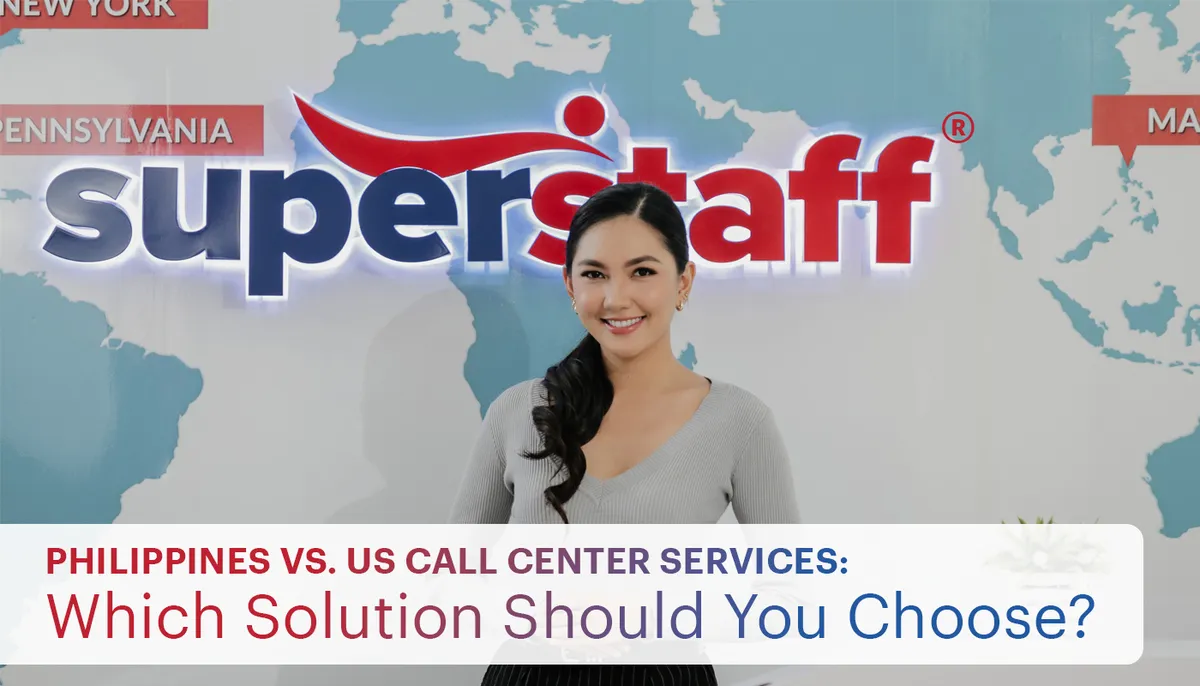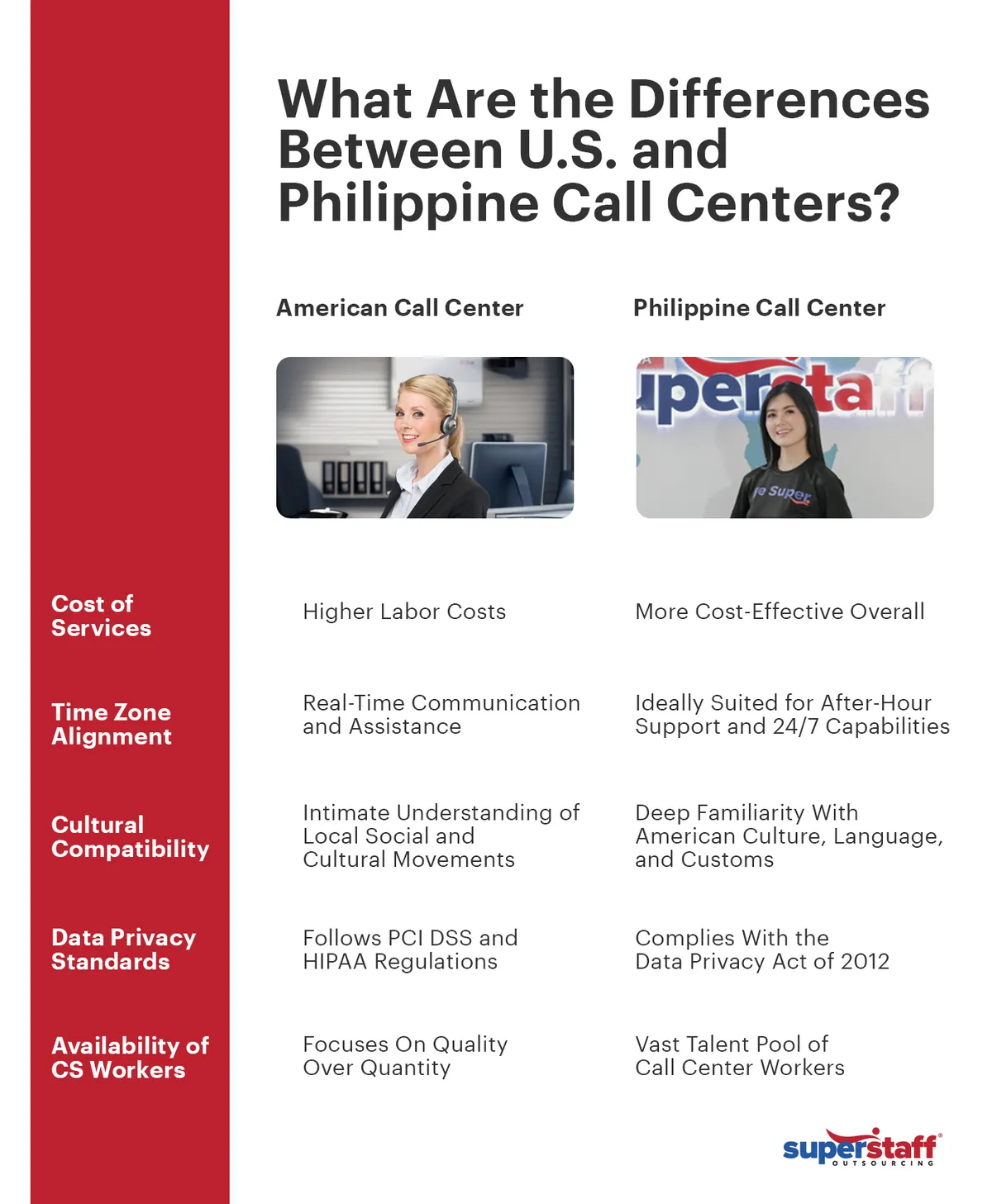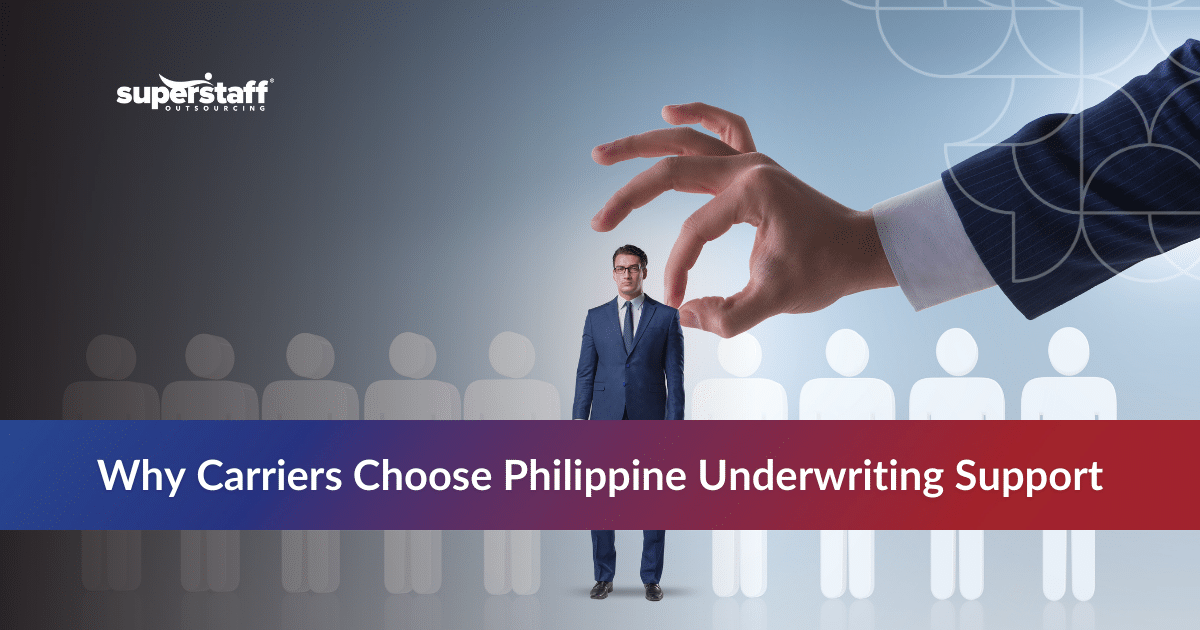
Modern businesses have become increasingly competitive, with many struggling to attract and retain customers. In the same vein, buyers have become more selective of the companies they choose to do business with, often having exceptionally high standards and expectations for service.
To retain their competitive advantage in the marketplace, businesses must invest in excellent customer service. However, not all brands have the in-house expertise and capabilities to handle all customer problems efficiently, at all times, and on whichever platform buyers choose. This is where call center companies can step in.
Through call center services, companies can ensure representatives are always available to answer customer inquiries, concerns, and feedback. However, location is a critical factor to consider before hiring an outsourced customer service team.
Would you rather work with an offshore or onshore CS team? This article will dive into the differences between Philippine and American call centers, helping you decide which outsourcing solution will work best for your business.
First Things First: What Is a Call Center?
A call center is an external provider focusing primarily on handling customer service calls, particularly addressing buyers’ inquiries, feedback, and issues with a particular company’s products and services.
As modern businesses become increasingly digitalized, call centers have evolved with the times, now offering omnichannel solutions. CS agents monitor and tackle customer complaints shared through email, live chat, social media, and other platforms.
Beyond customer support, call centers also handle various client-facing functions, such as outbound lead generation, telemarketing and telesales, and technical support and help desk. Regardless of the specific solutions you choose, the role of a call center is to help you nurture better relationships with your buyers.
Want to Outsource to a Cell Center in the Philippines or the U.S.? Here Are the Top 5 Factors to Consider
Now that you understand what a call center is, let’s discuss the differences between an onshore and offshore BPO destination. Some U.S. businesses prefer to work with a contact center within their home country, while others lean toward offshore facilities in the Philippines.
The location of your call center partner can influence the cost of services, how effective agents are at handling customer complaints, the availability of workers, and other essential considerations. Let’s discuss each of these individually so you can make informed decisions when hiring your ideal BPO partner.

#1: Cost of Services
At the end of the day, all businesses are concerned about their bottom line. One of the top reasons why many choose to outsource call center services is because of the cost-saving measure it provides. And it’s no secret that there’s a significant cost difference between the Philippine call center industry and its American counterparts.
American Call Centers Generally Have Higher Labor Costs
Cost is often the most prominent reason many U.S. companies prefer outsourcing to a call center outside their home country. Due to soaring cost of living standards and other wage culture premiums, the American BPO industry typically has much higher labor costs compared to offshore options.
Running a U.S.-based call center comes with increased expenses due to high employee salaries, benefits, and overhead expenses. Companies must also consider the costs of insurance, healthcare and dentistry, retirement packages, and other perks considered standard in the American workforce.
Philippine Call Centers Offer Cost-Effective Solutions
The Philippines has become a preferred call center destination for companies hoping to cut costs while ensuring service quality. Compared to their U.S. counterparts, Philippine call centers have much lower living and labor costs, allowing businesses to achieve more substantial cost savings.
You may wonder, “How much does a call center agent earn in the Philippines compared to one in America?” Studies have found that the average salary of a U.S. customer service agent is $22 to $35 per hour, while their counterparts in the Philippines earn an hourly rate of between $8 to $14.
Beyond lower living costs, cultural differences also shape the Southeast Asian nation’s ability to provide cost-effective services for U.S. companies. Unlike Western societies, which often highlight individuality and independence, family is central to Philippine culture.
Filipino families are known to be close-knit, with extended families living within the same home or close to each other. With these living arrangements, multiple people contribute to household income and spread responsibilities across the household, lowering the financial burden taken on by other family members.
#2: Geographic Proximity and Time Zone Alignment
Another factor to consider when choosing between an American or Philippine call center is the geographical distance between you and your BPO provider. Is proximity and time zone alignment crucial to your business model? Let’s discuss the advantages and disadvantages of onshore versus offshore options.
American Call Centers Can Provide Easier Real-Time Assistance
American call centers have an apparent advantage when serving clients within the same time zone. Hiring local customer service teams can be valuable for industries requiring immediate communication and assistance.
For example, manufacturing and distribution companies may benefit from real-time supply chain and logistics support, preferably with a customer service call center in similar time zones. An agent operating in the same time zone as your delivery service and buyers can enable more seamless coordination and ensure on–time order fulfillment.
However, companies must also remember that the United States operates in six different time zones plus 11 time zones when including U.S. colonial territories. One disadvantage of an onshore call center is that few can offer 24/7 service capabilities, particularly night-shift resources, because of limited customer support workers.
Philippine Call Centers Can Offer 24/7 and After-Hour Support
The main advantage of working with inbound call centers in the Philippines is that they typically offer round-the-clock support, proudly serving international markets and catering to multiple time zones across the globe. Because of the country’s massive pool of call center agents, there are enough workers to take on night shifts, allowing 24/7 coverage.
Hiring an offshore call center to handle after-hour calls can also be an excellent strategy for U.S. businesses with an in-house customer service team. With the 12-hour time zone difference between the United States and the Philippines, companies can allow their in-house workers to skip the night shift while opening the opportunity for extended customer service hours.
#3: Cultural Compatibility
For some industries, having call center agents who are updated on local political, social, or cultural movements may be crucial for connecting with conscious consumers. As such, it’s also important to discuss how American and Philippine service providers may handle cultural differences.
American Call Centers Are Intimately Familiar With Local Culture, For Better or Worse
If cultural compatibility is integral to your business model, partnering with an onshore call center is ideal. After all, U.S. agents are most likely to be intimately familiar with local culture, including how to build rapport with customers and understand what the average buyer expects from your brand.
When your business has a primarily American target audience, a U.S. call center may help you better connect with your buyers, providing a deep and rich cultural connection and understanding that may be harder to achieve with an offshore model.
For example, a pharmaceutical company may benefit from having an American team answering service calls because these local agents are familiar with the specific problems and issues of the U.S. healthcare system.
Additionally, onshore outbound call centers looking to upsell pharmacy products can leverage their understanding of local culture to empathize better and connect with callers. For instance, they could briefly engage your customer in small talk about a recent sporting event or trending show to get them into good spirits before tackling a more in-depth conversation.
However, one disadvantage of being intimately familiar with American culture is that some call center agents may struggle to stay neutral when faced with conversations tackling social or cultural issues. They may have unconscious biases impacting how they respond to or serve customers.
Philippine Call Centers Have a Good Understanding of the U.S. Culture
Due to strong historical and cultural ties between the Philippines and the United States, Filipino agents understand American culture well. The average Filipino worker is English-proficient, and with rigorous training, they can quickly adapt to their target callers’ cultural norms and preferences.
Because they are not native to the culture they’re serving, Filipino agents can also remain impartial more easily. They may be familiar with political, social, and cultural movements in the U.S. but will stay professional and neutral when confronted with different viewpoints or perspectives.
#4: Data Privacy and Protection Standards
Data protection and cybersecurity have become among companies’ top considerations when working with a business process outsourcing (BPO) partner. After all, your call center partner will handle many customers’ personal and financial data.
Is there a difference between the data protection protocols in the Philippines versus the U.S.? Let’s find out.
American Call Centers Follow Strict Data Regulation Protocols
With an onshore call center, you won’t have to worry about any personal or financial information getting leaked because the U.S. has strict data protection laws. Under the Payment Card Industry Data Security Standards Act or PCI DSS, American contact centers must comply with the following security standards:
- Always ask for consent before recording a conversation between a customer and their brand representative.
- Keep track of all agents with access to confidential or sensitive data.
- Do not record the Card Verification Value 2 (CVV2) number on credit cards.
- Undergo annual training to stay updated on security compliance laws.
For call centers that handle healthcare accounts, complying with the Healthcare Insurance Portability and Accountability Act, or HIPAA, is a must. This regulation, aiming to improve the effectiveness of the American healthcare system, includes strict standards on how providers and their call center partners must handle patients’ medical information.
Philippine Call Centers Comply With International Data Protection Standards
Like their American counterparts, Philippine call centers adhere to data protection laws. One notable regulation is the Data Privacy Act of 2012, which seeks to protect all forms of personal, private, and sensitive information.
The National Privacy Commission (NPC) is responsible for implementing and enforcing this law by regulating how data is collected and processed, ensuring call centers and all companies comply with these standards, and promoting awareness of best practices in data protection.
Non-compliance can subject companies to hefty fines, penalties, and civil liabilities. As such, call centers in the country invest in robust cybersecurity measures and comply with international data privacy standards to ensure that client’s confidential data is kept safe and secure.
#5: Availability of Customer Service Workers
Finally, when assessing the differences between an American and a Philippine call center, the availability of customer service workers is another critical factor to consider. Make sure the call center provider you hire has access to enough agents to meet the needs of your growing company.
American Call Centers Have a Smaller Pool of CS Agents
For many companies, the primary advantage of working with a U.S.-based call center is the assurance that your workers will deeply understand local culture, trends, and linguistic nuances. American agents are also highly likely to have strong communication skills.
However, compared to other countries, customer service jobs are not highly prized in the United States. As such, not many American workers actively choose to work for call centers, contributing to a much tighter and smaller talent pool for onshore companies.
Philippine Call Centers Have Access to a Massive CS Talent Pool
As one of the pioneers of the global BPO industry, the Philippines has decades of experience nurturing talent for customer service outsourcing. Call center work is perceived as a valuable job opportunity in the country, with many Filipino college graduates gravitating to BPOs when starting their careers.
You may wonder, “How many call center agents are in the Philippines?” Industry analysts estimated that over 1.3 million Filipinos worked in BPO companies, but the number may rise to 2.3 million by 2028.
The Philippine education system also prioritizes English language proficiency, producing a vast pool of bilingual workers. Because of close cultural ties with the United States, Filipinos almost exclusively speak American English and are familiar with U.S. cultural nuances, including popular slang and idioms.
Beyond language advantages, Filipinos are also known for their culture of hospitality and empathy, making them natural customer service workers. Even during brief customer calls, they can exude exceptional warmth and understanding.
The Final Verdict: Is Call Center Outsourcing to the Philippines or the U.S. the Right Choice for You?
After breaking down each critical factor companies must weigh when deciding between an American and Philippine call center, you may ask yourself, “Which one should I pick?”
Here’s the answer: Onshoring and offshoring each have their own sets of advantages and disadvantages. Your call center solution should depend on your business’s needs and goals.
If your business caters exclusively to American customers and regularly navigates complex topics specific to your local culture, working with a call center in the U.S. may be the better choice. For example, a healthcare provider may want to hire specialized medical call center services, particularly those familiar with Medicaid provisions and other U.S.-specific laws and regulations.
If saving costs is a more important consideration for your business, hiring a Philippine call center is the best option. Additionally, if you get a lot of after-hour calls, Filipino agents can provide the 24/7 support capabilities your business requires.
For greater flexibility, you can also opt for a hybrid outsourcing strategy that blends onshore and offshore capabilities.
How To Optimize Your US + Philippine Outsourcing Strategy

A hybrid outsourcing strategy is often more complex than a singular outsourcing approach. As such, executing a combination of onshore and offshore models will require detailed planning to be effective. Here are a few best practices to keep in mind when drafting your outsourcing plan:
Find the Right Balance Between Onshore and Offshore Work
To make the most of your hybrid onshore + offshore strategy, the first step is to assess your business needs and identify which areas your business will benefit most from outsourcing. Assess which operations are best handled in-house and which can be managed reliably by external sources.
We recommend identifying and keeping your core competencies onshore, more or less 25% of your total operations. The rest of your customer experience initiatives (over 50%) can be outsourced to an offshore call center.
Once you’ve decided which customer service functions to outsource, clearly define the roles and responsibilities you want your outsourcing provider to take on. This way, you won’t leave any room for confusion, ensuring you and your call center partner are aligned on your goals and objectives.
Choose an Outsourcing Partner That Meets Your Specific Needs
After determining which business areas will benefit from being outsourced, the next step is finding a provider to meet your needs. For example, do you need call centers with technical expertise, omnichannel capabilities, or multilingual solutions? The right BPO partner can fill the gaps in your customer service operations.
While choosing between different service providers, it’s essential to conduct thorough research on the team you’ll be working with – their expertise, track record, previous works, and, if possible, clients they’ve worked with.
In addition to being able to handle the customer service tasks you require, your ideal customer service call center must also have values that align with yours. Ask candidates about their workplace culture, business values, and communication practices so that you can have a better idea of what a partnership between your two companies will realistically look like.
Regularly Communicate With Your Outsourced Team
Finally, effective communication is the key to a successful and long-lasting outsourcing partnership. As you negotiate the terms of your agreement with the call center of your choice, immediately establish your preferred methods of communication and how frequently you expect to hear from them.
The right call center provider will provide timely updates on the performance of your customer service team. They will set relevant KPIs and metrics to ensure they meet your expectations and standards.
Encourage constant communication and collaboration between your in-house and outsourced teams for a seamless relationship. Set up daily chats or weekly meetings with everyone so you can ensure all members are on the same page about workload and tasks.
Additionally, facilitating knowledge sharing and training sessions between teams can help all parties perform better individually and as a group.
Get the Best of Both Worlds With a Call Center in the Philippines and the United States
Are you ready to begin your customer service outsourcing journey? Get in touch with the BPO professionals at SuperStaff.
With strategic locations in the U.S. and the Philippines, SuperStaff provides top-notch call center services for businesses looking to expand their CS capabilities. Whether you’re looking for an onshore or offshore team (or a mix of both), count on us to connect you with world-class agents who can give your customers the best possible service.






